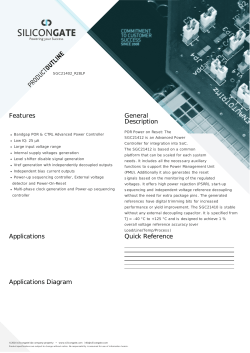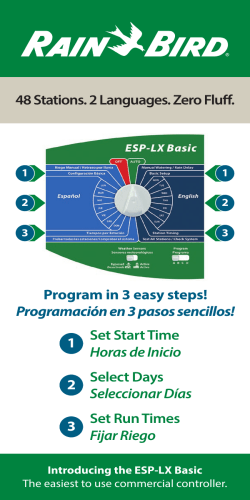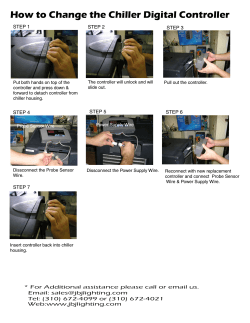
BODAS Controller RC Series 21
BODAS Controller RC RE 95201/02.12 Replaces: 03.09 1/16 Series 21 Data sheet For closed- and open-loop control of hydraulic components Contents Features Ordering code 2 –– Component of BODAS system for mobile applications Description 2 –– Robust design meeting specifications for mobile applications Block circuit diagram 3 –– High electromagnetic compatibility (EMC) Technical data 4 –– Inputs and outputs with fault detection Connection diagram RC2-2 6 Connection variants 7 –– Safety features such as redundant inputs and central safety cut-off for all outputs Overview of functions 8 –– Pulse-width-modulated (PWM) solenoid currents for minimum hysteresis Dimensions RC2-2 10 Installation position 11 –– Closed-loop control of solenoid currents, i.e. not dependent on voltage and temperature Mating connector 12 –– Sturdy, sealed aluminum housing Safety instructions 13 Main components –– Powerful 16-bit microcontroller module –– Protected watchdog processor for program run monitoring –– Serial data interface and CAN-bus interface for diagnostics, parameter setting and display of process variables –– Supply voltage and ground connections for potentiometers and sensors 2/16 Bosch Rexroth AG RC Series 21 Ordering code RC 2-2 01 02 / Description 21 03 Type 01 BODAS controller RC Version 02 RE 95201/02.12 1st digit = no. of proportional outputs 2-2 2nd digit = no. of switched outputs Series 03 Series 2, index 1 21 Note: The BODAS controllers are not functional without software. In order to use the BODAS controllers, you also need: –BODAS standard software or –Application-specific software Optional accessories –– BODAS-design software The Windows-based PC software BODAS-design (RE 95112) is used for programming the BODAS controller RC. All graphic and text-based programming languages specified in the IEC 61131-3 standard are available for programming. –– BODAS-service software The Windows-based PC software BODAS-service (RE 95086) is used for displaying functions, errors and system variables as well as for setting parameters via a PC. –– BODAS measuring adapter MA The BODAS measuring adapter MA (RE 95090) is used for measuring all electric signals at the inputs, outputs and interfaces of the BODAS controller. For test purposes, it is connected in series between the controller and the vehicle or device wiring. –– BODAS test box TB3 The BODAS test box TB3 (RE 95092) is used for simulating vehicle and equipment functions for development and test purposes with BODAS controllers. The BODAS test box TB3 is connected to the controller with the adapter cable TAK1/10. –– BODAS CAN I/O extension module RCE12-4/22 The BODAS CAN I/O extension module RCE12-4/22 (RE 95220) is used for I/O extension of a controller in the event that the number of controller inputs and outputs is insufficient for the specified application. All products mentioned here are available from Bosch Rexroth. Further information can be found on the Internet at: www.boschrexroth.com/mobile-electronics The BODAS controllers RC are used for the programmable control of proportional solenoids and additional switching functions. They can therefore be used for both simple and complex open- or closed-loop controls, e.g. for hydrostatic travel drives, working hydraulics or transmission control in mobile working machines. BODAS controllers RC were specially developed for use in mobile working machines, and satisfy the relevant safety requirements with regard to ambient temperature, tightness, resistance to shock and vibration, as well as electromagnetic compatibility (EMC). Internally, BODAS controller RC consist of a powerful 16-bit microcontroller and all input and output circuitry. Analog voltages, resistances, frequencies and switching information are processed as input signals. The inputs are protected against overvoltage and electrical interference. The voltage inputs can be monitored to detect any cable breaks or short circuits. The proportional solenoid outputs are pulse-width-modulated (PWM) and optimally adapted for electric proportional control of axial piston units and valves to ensure high accuracy and minimum hysteresis. The switched outputs are designed for the direct switching of relays, lamps and switching solenoids. The RS232 serial interface enables the connection of a laptop to the BODAS-service PC software for service functions, such as diagnostics, parameter setting or display of process variables. CAN-bus interfaces are available with all BODAS controller RC for exchanging data with other bus users or electronic systems (e.g. RC or RCE, joystick valves, diesel engine injection, display). The CAN-bus interfaces can each be operated with different protocols. BODAS standard programs are available for the BODAS controller RC software. If more extensive functions are required, special program packages for specific applications can also be compiled using a program library and adapted to the application in question with the aid of service tools. Programming with BODAS-design is also possible. Combined with pumps, motors, valves, sensors, input devices and actuators from Bosch Rexroth, BODAS controllers RC and corresponding software can be used to create complete system solutions. RE 95201/02.12 Bosch Rexroth AG RC Series 21 3/16 Block circuit diagram Controller Output enable stages Power supply output stages Power supply electronics Ignition switch Frequency inputs Power supply Reset Supply voltage with integrated watchdog & Clock timing Power supply Release Switch-on pulse Inputs Frequency inductive / active Central safety cut-off Outputs PWM output stage PWM output stage Microcontroller 16 bit Flash EEPROM RAM EPROM 8 kByte 128 kByte 512 kByte Switch output stage Counter input A/D converter, 10 bit Digital inputs Low-side current measurement with switching function High-side proportional solenoid outputs Switched outputs DSM frequency Voltage inputs Temperature inputs Voltage Temperature (resistance) Current inputs Current Switch inputs Switches Programming Control unit for outputs Low-side measurement inputs with switch Interface controller Interface driver Serial interface RS232 Interface driver CAN-bus interface Evaluation 4/16 Bosch Rexroth AG RC Series 21 RE 95201/02.12 Technical data Controller RC Nominal voltage Residual ripple (DIN 40839, Part 1) Supply voltage, permitted range Current consumption Without load, maximum With load, maximum Fuse Internal: External: for switch and proportional solenoid outputs For electronics For sensors Constant voltage source E.g. for setpoint potentiometer 1 - 5 kΩ Analog voltage inputs (may also be used as switch input)1) Analog current inputs (may also be used as switch input as well as analog voltage input)1)5) Switch inputs May be switched between high/low active (may also be used as an analog voltage input as well as a frequency input) Frequency inputs for inductive and active sensors (may also be used as switch input)1) Frequency inputs for DSM+HDD1 sensors (may also be used as switch input)2) Resistor inputs for temperature sensors (may also be used as switch input)2) Proportional solenoid outputs (PWM) Current range Adjustable dither frequency Control frequency Switched outputs (MOSFET) (may also be used as PWM outputs) Low-side measurement input5) Additional PWM output stage when used in combination with one or both switched outputs Current range Adjustable dither frequency Control frequency Interfaces RS232 C CAN 2.0 B Fault detection for cable break and short circuit Analog inputs Proportional solenoid outputs and switched outputs Protection against short circuit of the inputs and outputs Against supply voltage and ground3) Reverse-connect protection Power supply / battery4) 2-2 12 and 24 V max. ± 2 V 9 - 32 V mA A 150 8 AT AT AT – 8 3 1 5 V ± 0.1 V, 30 mA 2 0-5V 2 0 - 20 mA and 0 - 8 V 2 low < 1.5 V; high > 4.5 V 4 0 - 10 kHz; > 1 VRMS 2 0 - 13.5 kHz 2 800 Ω - 1800 Ω 4 0 - 2.3 A 100 - 250 Hz 1 kHz 2 max. 2 A 2 0 - 2.0 A 100 - 250 Hz 0.5 kHz 1 ISO 11898 1 1 Switchable with supply voltage. Can be used as switch inputs if externally connected to GND. 3) Voltages greater than those applied to supply pins 1, 27, 41, 42 must not be applied to the outputs. Except GND, sensor GND, constant voltage sources, resistance (temperature) inputs and CAN interfaces against battery voltage. 4) The external fuse trips in the event of voltage reversal. 5) When using as a switching function, the notes in the respective, applicable software description (API) are to be observed. 6) Load 484 Ω. Can be switched by means of software to 22 kΩ. 1) 2) RE 95201/02.12 Bosch Rexroth AG RC Series 21 5/16 Technical data Controller RC Microcontroller Clock frequency Memory capacities RAM Flash EPROM EEPROM Software installation Download via RS-232 Download via CAN Electromagnetic compatibility Spurious interference (directive 2004/104/EC) MHz 2-2 C167CR 30 kByte kByte kByte 128 512 8 100 VRMS/m; (details on request) Line-bound interference (ISO 7637-1/-2/-3) Values on request Load dump 123 V at 27.0 V supply voltage 87 V at 13.5 V supply voltage 8 kV 15 kV W at 32 V -40 to +85°C (-40 to +185°F) -40 to +85°C (-40 to +185°F) 5 10 g; 57 - 2000 Hz 20 cycles per axis Electrostatic discharge ESD (acc. to ISO 10605) Not in operation In operation Max. dissipation power Operating temperature, case Storage temperature, case Vibration resistance Sinusoidal vibration (IEC 60068-2-6) Random-shaped vibration (IEC 60068-2-36) 0.05 g2 / Hz 30 min per axis Shock resistance Transport shock (IEC 60068-2-27) Continuous shock (IEC 60068-2-29) 15 g; 11 ms per spatial axis x, y, z and in each direction (pos./neg.) 25 g; 6 ms per spatial axis x, y, z and 1000x in each direction (pos./neg.) Resistance to moisture (IEC 60068-2-30Db; Variant 2) Resistance to salt spray (IEC 60068-2-11) Type of protection (DIN / EN 60529)1) Without / with mounted mating connector Case material Weight Outer dimensions Mating Connector 1) Taking installation notes into account 95% (+25 to +55°C) 72 h, 35 °C, 5% NaCl IP54k / IP 65 Diecast aluminum Approx. kg Length (in mm) Width (in mm) Height (in mm) 52-pin 28-pin 0.5 114 204 45 1 – 6/16 Bosch Rexroth AG RC Series 21 RE 95201/02.12 Connection diagram RC2-2 1 A3 ) Ignition switch10) Safety switch 13 3A 41 30 15 42 10 A Supply voltage of the output stages 27 +12 V/+24 V 30 + 1 2 28 Speed sensor DSM only FRQI_A1 44 43 FRQI_A2 18 17 FRQI_A3 22 7 FRQI_A4 9) 9) 2) PWM_A1 2.3 A Proportional solenoids 30 PWM_A2 2.3 A 2) Sensor supply voltage 2 x 5 V/30 mA5) DSM only 33 32 Proportional outputs 31 31 Frequency inputs - Shutdown Outputs8) Switch-on signal Electronic supply 8) 7) 45 CUR_A2 5V constant voltage 7) Switched outputs Current source 0 - 20 mA CUR_A1 Low-side measurement input 34 ANA_A2V ANA_A2 Voltage inputs Potentiometer ANA_A1V ANA_A1 Current-/ voltage inputs 36 35 38 47 46 49 29 DIGL_A1 2A DIGL_A2 2A Switched outputs 2) 15 2) 3 PMI_A1 8 7) 7) 7) 7) 20 T_A1 9 ) Temperature inputs Temperature sensor T_A2 9 ) 9 21 T_A3 9 ) 49 T_A4 9 ) 37 DIG_A1 48 DIG_A2 10 DIG_A3 51 TxD 50 RS-232 24 RxD BST C D B E A H G F 52 CAN H 40 26 120 Ohm 25 4 ) CAN-bus interface4) 6) 6) 11 See next page for footnotes DIG_A4 Voltage-/ switch inputs 39 Switches Diagnostics connector for BODAS-service CAN L 1) RE 95201/02.12 Bosch Rexroth AG RC Series 21 Connection variants Sensor power supply Monitored potentiometer 2.5 to 5 kΩ 36/ 47 11) Voltage input 38/ 49 11) Current input 35/ 46 34/ 45 Short, low-resistance connection from a case screw to the device ground or vehicle ground Separate ground connection from solenoid return line to battery (chassis possible) 3) Separate fuses for switches and sensors necessary 4) CAN bus: termination resistor 120 Ω necessary 5) Sensor supply voltage for potentiometers and active sensors 6) Can be switched together between high / low active by means of software - pull-up or pull-down for these inputs 7) Separate ground connection for current source to battery, controller GND possible (pins 38/49) 8) If ≥ 5 V is applied to the input, all power outputs are off 9) Can be used as switch inputs if externally switched to GND 10)The terminals are labeled according to DIN 72 552. This does not apply for the controller. 11) Internal pull-down resistor 1) 2) 7/16 8/16 Bosch Rexroth AG RC Series 21 RE 95201/02.12 Overview of functions Pin Description Main function Alternative functions 37, 48, 10, 11 Digital input with selectable pull-up/ pull-down after 5 V / GND Pull-up/pull-down switched in 2 groups: DIG_A1... DIG_A2, DIG_A3... DIG_A4 Digital input Threshold, programmable via software Pull-up / pull-down resistance switchable by means of software Analog voltage input Measuring range 0-5V Resolution 10 bit (5.93 mV/Bit) Input resistance DC to GND 18.3 kΩ Limit frequency filter 9 kHz Basic setting with open GND terminal 33, 44 Inductive frequency input FRQI_A1 … FRQI_A2 Frequency input for inductive and active sensors type PNP and NPN (e.g. HDD1) Frequency evaluation up to 10 kHz Input resistance 115 kΩ Digital input Evaluation options • Threshold programmable via software 18, 22 DSM frequency input FRQI_A3 … FRQI_A4 Frequency input for Bosch Rexroth DSM sensors Frequency evaluation including additional information such as direction of rotation and error monitoring up to 13.5 kHz (max. tooth pulsation frequency 6.5 kHz) Frequency input for type NPN sensors (e.g. HDD1) Frequency evaluation of active speed sensors switched to ground. Caution: Short circuit current up to 40 mA Digital input switching to GND Evaluation options • Threshold programmable via software • Digital current threshold 10 mA +3 mA 35, 46 Analog voltage input ANA_A1 … ANA_A2 Analog voltage input Measuring range 0-5V Resolution 10 bit (5.37 mV/bit) Input resistance DC to GND 110 kΩ Limit frequency filter 17.5 kHz Digital input Evaluation options • Threshold programmable via software 34, 45 Analog current input with selectable load (input resistance) CUR_A1 … CUR_A2 Analog current measurement Measuring range 0 - 20 mA Load 484 Ω Resolution 10 bit (10.8 mV/Bit) Input resistance Limit frequency filter 2.9 kHz Analog voltage input Measuring range 0 - 10 V Resolution 10 bit (10.8 mV/bit) Input resistance DC to GND 11.02 kΩ Limit frequency filter 2.9 kHz Digital input Evaluation options • Threshold programmable via software LED output Can be used as LED output with external protective resistor to battery voltage. 8, 20, 9, 21 Temperature input T_A1 … T_A4 Temperature measurement by me- Digital input switching to GND ans of resistance measurement in Evaluation options • Switching thresholds < 1.6 V low connected temperature sensors > 1.8 V high Evaluation of passive temperature sensors with PTC measuring resistors RE 95201/02.12 Bosch Rexroth AG RC Series 21 9/16 Overview of functions Pin Description Main function Alternative functions 31, 30 PWM output stage PWM_A1 … PWM_A2 PWM output stage High-side switch Dither frequency programmable via software Integrated suppression diode for inductive kickback Max. current 2.3 A Pulse duty factor 5 - 95% Switch output stage Diagnostics-compatible actuated time 0% / 95% 29, 15 Power switch output stage DIGL_A1 … DIGL_A2 Switch output stage High-side switch Max. current 2.0 A Integrated suppression diode for inductive kickback PWM output stage in combination with pin 3 High-side switch Dither frequency programmable via software Integrated suppression diode for inductive kickback Max. current 2.0 A Pulse duty factor 0 - 100% 3 Low-side switch output stage PMI_A1 Switch output stage Low-side switch with current measurement 0 - 2.65 A Max. current 4A Limit frequency filter 246 Hz Integrated suppression diode for switching relay coils PWM output stage in combination with pins 29 or 15 Low-side switch Integrated suppression diode for inductive kickback 36 Sensor supply ANA_A1V Sensor supply Output voltage Precision Load capacity 5.0 V 5% 30 mA Sensor supply ANA_A2V Sensor supply Output voltage Precision Load capacity 5.0 V 5% 30 mA 13 Output enable1) INH Digital input Levels ≥ 5 V cause output stages to be blocked Input resistance DC to GND 20 kΩ 40, 39 CAN interface CAN1_H, CAN1_L CAN interface CAN 2.0B, 1 Mbaud 25, 26 CAN termination CAN1_H_T, CAN1_L_T CAN termination Termination resistor 120 Ω for CAN_1 by bridging contacts 25 and 26 in the plug 51, 50 RS232 interface TxD, RxD RS232 C interface Baudrate up to 56 kbaud 52 BST Boot strap for flashing via RS232 with BODAS Flash adapter FA1 47 1) Independent input for release/shutdown of the power outputs. 10/16 Bosch Rexroth AG RC Series 21 RE 95201/02.12 Dimensions RC2-2 max. 45 120 27 28 2 41 42 29 30 15 16 3 4 51 52 39 40 25 26 13 14 max. 17 38 1 188 d 204 c 180 7 0.2 90 Fixing: a b 87 105 max. 114 max. 1441) min. 1692) 28 –– The BODAS controller must be fixed at 4 points (a, b, c and d). –– Tightening torque MA = 8 ± 2 Nm for fixing the BODAS controller with M6 screws. –– Tightening torque applies for mounting without washer. The equivalent tightening torque must be calculated when using washers. –– Bosch Rexroth’s approval is required if mounting is different from above. –– Installation point: evenness of mounting surface 0.5 –– The wiring harness should be fixated mechanically in the area in which the controller is installed (spacing < 150 mm). The wiring harness should be fixated such that a phase excitation with the controller occurs (e.g. at the controller mounting point). If the mounting surface is not sufficiently even, place flexible compensating elements (e.g. rubber washers) between the fixing points of the BODAS controller and the mounting surface. 1) 2) Space required for mating connector Space required for plugging and unplugging the mating connector RE 95201/02.12 Bosch Rexroth AG RC Series 21 Installation position ³® ® ® ® ® ® Note: Installation position only permissible with specified angular range. 11/16 12/16 Bosch Rexroth AG RC Series 21 RE 95201/02.12 Mating connector Order designations for mating connector, consisting of: Number for AMP-Tyco MT2/JPT 52-pin Designation AMP No. ID No R902602414 Junior-Power-Timer-contacts 0-0964285-2 4 Single-wire seals JPT 0-0963293-1 4 Micro-Timer-2 contacts 0-0964275-2 48 Single-wire seals MT2 0-0964972-1 48 Basic unit MT2/JPT; 52-pin 0-1393450-3 1 Cover 0-1393454-7 1 Leakage dummy plugs F.D3,6-MT2 0-0963531-1 40 The mating connector is not included in supply. The mating connector is available from Bosch Rexroth as a kit with all materials under the following material number: –– Mating connector kit 52-pin: Mat. no. R902602414 Recommended line Recommended connection lines for contacts 1, 2, 27 and 28: –– Cross section 1.0 mm² (16 AWG with thin insulation) –– Outer diameter: 2.0 mm - 2.7 mm Recommended connection lines for the other contacts (except for 1, 2, 27 and 28): –– Cross section 0.5 mm² (20 AWG) –– Outer diameter: 1.9 mm - 2.1 mm Tools needed Tyco AMP order numbers for crimping and extractor tools For crimping Description Partlist number For connection Hand-held crimping tool 169 400-0 Insert 539 612-1 MT-2 (Micro Timer) Insert 539 614-1 JPT (Junior Power Timer) For disassembly Description Partlist number For connection Extractor tool 539960-1 MT-2 (Micro Timer) Extractor tool 1-1579007-6 JPT (Junior Power Timer) Applicable documents –– Applicable Tyco AMP specification No.: 114-18081 This document contains the recommended crimping data and crimping tools for Micro Timer contacts, model MT2. –– Applicable Tyco AMP specification No.: 114-18050 This document contains the recommended crimping data and crimping tools for Junior Power Timer contacts, model JPT. RE 95201/02.12 RC Series 21 Bosch Rexroth AG 13/16 Safety instructions General instructions –– Reliable operation cannot be guaranteed if samples or prototypes are used in series production machines. –– The proposed circuits do not imply any technical liability for the system on the part of Bosch Rexroth. –– Incorrect connections could cause unexpected signals at the outputs of the controller. –– Incorrect programming or parameter settings on the controller may create potential hazards while the machine is in operation. It is the responsibility of the machine manufacturer to identify hazards of this type in a hazard analysis and to bring them to the attention of the end user. Bosch Rexroth assumes no liability for dangers of this type. –– The component firmware/software must be installed and removed by Bosch Rexroth or by the authorized partner concerned in order to uphold the warranty. –– It is not permissible to open the controller or to modify or repair the controller. Modification or repairs to the wiring could result in dangerous malfunctions. Repairs to the controller may only be performed by Bosch Rexroth or by an authorized partner. –– To switch off the system in emergencies, the safety switch may be used. The switch must be in an easily accessible position for the operator. The system must be designed in such a way that safe braking is ensured when the outputs are switched off. –– When the electronics is not energized no pins must be connected to a voltage source. Thus, when the current supply is switched off, the supply for the electronics, the power outputs and the external sensor supply have to be switched off together. –– Make sure that the controller´s configuration does not lead to safety-critical malfunctions of the complete system in the event of failure or malfunction. This type of system behavior may lead to danger to life and/or cause much damage to property. –– System developments, installations and commissioning of electronic systems for controlling hydraulic drives must only be carried out by trained and experienced specialists who are sufficiently familiar with both the components used and the complete system. –– While commissioning and maintenance the controller (with BODAS Tools) the machine may pose unforeseen hazards. Before commissioning the system, you must therefore ensure that the vehicle and the hydraulic system are in a safe condition. –– Make sure that nobody is in the machine‘s danger zone. –– No defective or incorrectly functioning components may be used. If the components should fail or demonstrate faulty operation, repairs must be performed immediately. –– Controller used to develop software may only be installed in series production machines if it can be guaranteed that these controller have not been flash-programmed with new software more than 500 times. Controller that have been programmed more than 1000 times are not to be installed in series production machines! Notes on the installation point and position –– Do not install the controller close to parts that generate considerable heat (e.g. exhaust). –– Radio equipment and mobile telephones must not be used in the driver‘s cab without a suitable antenna or near the control electronics. –– A sufficiently large distance to radio systems must be maintained. –– All connectors must be unplugged from the electronics during electrical welding and painting operations. –– Cables/wires must be sealed individually to prevent water from entering the device. –– The controller must not be electrostatically charged, e.g. during painting operations. –– The controller will heat up beyond normal ambient temperature during operation. To avoid danger caused by high temperatures, it should be protected against contact. –– Install the control unit in such a way that the electrical plug is facing downwards. This ensures that any condensation water that may form can flow out. –– Standing and permanently running water are not permitted anywhere near the circumferential groove (lid/base connector) or the pressure balance element (DAE). –– The case must be wired to vehicle ground in order to comply with EMC guidelines. Metallic screws are used to create a connection to vehicle ground. 14/16 Bosch Rexroth AG RC Series 21 RE 95201/02.12 Safety instructions Notes on transport and storage –– If it is dropped, the controller must not be used any longer as invisible damage could have a negative impact on reliability. –– Control units must be stored with a mean relative humidity of 60% and at a temperature between -10 °C and +30 °C. Storage temperatures between -20 °C and +40 °C are briefly permissible, for up to 100 hours. –– After a storage time of more than 5 years, the controller must be examined by the manufacturer. Notes on wiring and circuitry –– The electronics and the power outputs of a controller must be fed from the same power source. –– When wiring the output stages, the maximum cumulative output current for each output stage group should be noted. The cumulative output current means a permanent, simultaneous actuation of the output stages. –– Lines to the speed sensors are so short as possible and be shielded. The shielding must be connected to the electronics on one side or to the machine or vehicle ground via a low-resistance connection. –– The product may only be wired when it is de-energized. –– Lines to the electronics must not be routed close to other power-conducting lines in the machine or vehicle. –– The wiring harness should be fixated mechanically in the area in which the controller is installed (spacing < 150 mm). The wiring harness should be fixated so that in-phase excitation with the controller occurs (e.g. at the controller bolting point). –– If possible, lines should be routed in the vehicle interior. If the lines are routed outside the vehicle, make sure that they are securely fixed. –– Lines must not be kinked or twisted, must not rub against edges and must not be routed through sharp-edged ducts without protection. –– Lines are to be routed with sufficient spacing to hot or moving vehicle parts. –– PWM outputs must not be linked or bridged. –– Proportional outputs (PWM_A1, PWM_A2, PMI_A1) must not be used to power lamps. –– The sensor supplies can be „pulled up“ by external connection, e.g., the application of a higher voltage, because they operate only as a voltage source but not as a voltage sink! Pulling up a sensor supply may result in unexpected malfunctions and damage of the controller in lasting operation. –– The „high side“ outputs may not be externally connected to battery. Note on proportional and switching solenoids and other wired inductive consumers –– The proportional solenoids must not be wired with spark-suppression diodes. –– Switching solenoids at the outputs of the control unit do not need to be connected to spark-suppression diodes. –– The electronics may only be tested with the proportional solenoids connected. –– Other inductive loads that are in the system but not connected to the controller must be connected to spark-suppression diodes. This applies to relays (e.g. for de-engergizing the controller) that have the same supply as the controller, too. Intended use –– The controller is designed for use in mobile working machines provided no limitations / restrictions are made to certain application areas in this data sheet. –– Operation of the controller must generally occur within the operating ranges specified and released in this data sheet, particularly with regard to voltage, current, temperature, vibration, shock and other described environmental influences. –– Use outside of the specified and released boundary conditions may result in danger to life and/or cause damage to components which could result in consequential damage to the mobile working machine. Improper use –– Any use of the controller other than that described in chapter „Intended use“ is considered to be improper. –– Use in explosive areas is not permissible. –– Damage resulting from improper use and/or from unauthorized interference in the component not described in this data sheet render all warranty and liability claims void with respect to the manufacturer. RE 95201/02.12 RC Series 21 Bosch Rexroth AG 15/16 Safety instructions Use in functions relevant to safety –– The customer is responsible for performing risk analysis of the mobile working machine and determining the possible safetyrelated functions. –– In safety-related applications, the customer is responsible for taking suitable measures for ensuring safety (sensor redundancy, plausibility check, emergency switch, etc.) -- For example, a suitable assignment of input variables (e.g. by connecting the acceleration pedal signal to two independent analog inputs) can be used to detect faults and to activate specially programmed reactions. -- Special measures may be initiated if the plausibility check shows deviations between the setpoint values and the values read back by the microcontroller. –– Product data that is necessary to assess the safety of the machine can be provided on request or are listed in this data sheet. -- For all control units, the notes found in the API description and in the online help section of BODAS must be observed. Safety features in the BODAS controller –– The input circuits for speed and analog signals partially feature circuits that are mutually electrically isolated. Through appropriate input connections, the microcontroller and, when used, the software diagnostic function can detect faults. –– Faults in the supply voltage are detected by internal monitoring. –– All output signals can be monitored by the microcontroller with the appropriate software. –– For service purposes, the controllers can be operated with all power outputs de-energized. –– The internal watchdog module decentrally switches off the power supply of all proportional and switched outputs when there are malfunctions in the program run. Further information –– In addition, the application-specific documents (connection diagrams, software descriptions, etc.) are to be observed. –– More detailed information on BODAS controllers may be found at www.boschrexroth.com/mobile-electronics. 16/16 Bosch Rexroth AG Bosch Rexroth AG Mobile Electronics Glockeraustraße 4 89275 Elchingen, Germany Telephone+49 (0) 73 08 82-0 Telefax +49 (0) 73 08 72-74 [email protected] www.boschrexroth.com/mobile-electronics RC RE 95201/02.12 © This document, as well as the data, specifications and other information set forth in it, are the exclusive property of Bosch Rexroth AG. It may not be reproduced or given to third parties without its consent. The data specified above only serve to describe the product. No statements concerning a certain condition or suitability for a certain application can be derived from our information. The information given does not release the user from the obligation of own judgment and verification. It must be remembered that our products are subject to a natural process of wear and aging. Subject to change.
© Copyright 2026









